M’sian agritech startup bags RM3.2M in round led by 500 Global to grow its patented solution
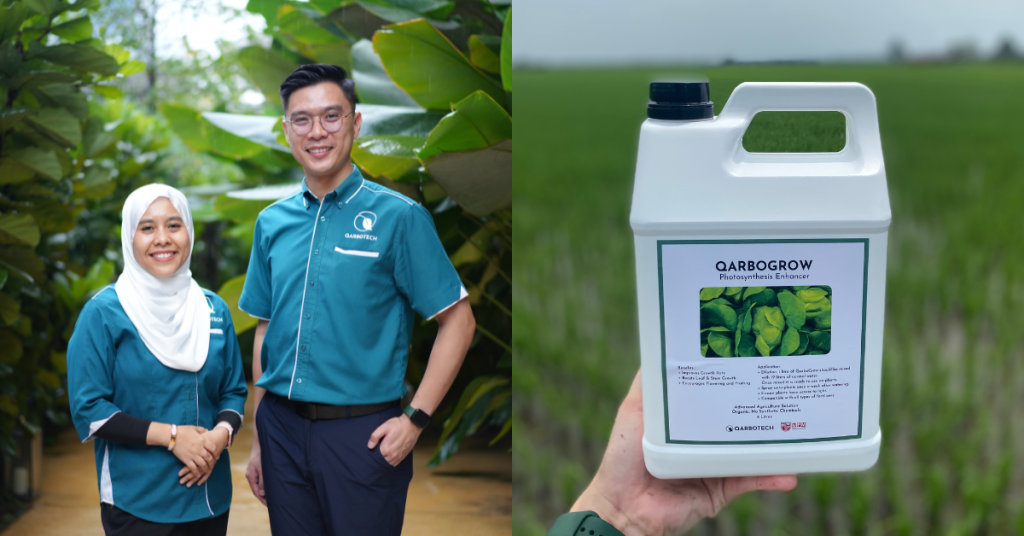
Malaysian agritech startup Qarbotech announced Monday (December 4, 2023) that it has closed US$700,000 (approximately RM3,264,450 at the time of writing) in seed funding and grants.
This seed round was led by 500 Global, and includes grants from the Singaporean government-linked Temasek Foundation, and Malaysia’s Khazanah Nasional.
Both grants were won through challenges, namely Temasek Foundation’s Climate Impact Innovations Challenge and the Khazanah Impact Innovation Challenge 2023.
Established in 2018, Qarbotech offers a biocompatible solution, having developed patented photosynthesis enhancement nanotechnology that increases crop yields by 60%.
It works by using organic compounds with properties similar to chlorophyll, which increases leafy plants’ photosynthesis rates, resulting in shorter growth cycles and thus higher yield.
According to a press release, the fresh funds will be used by Qarbotech to strengthen their R&D efforts and expand their manufacturing facility to produce up to 50 times its current capacity.
This will allow them to serve farmers and growers in new markets across Southeast Asia. Based in Kuala Lumpur, it has already extended its services abroad, namely in Indonesia.
“As the industry’s most accessible photosynthesis enhancer, we are pioneering a new and disruptive solution that will reshape conventional approaches to farming,” Chor Chee Hoe, the CEO and co-founder of Qarbotech said.
“The strategic support from our investors propels us towards scalable growth, but more importantly, allows us to empower more farmers around the world to feed the rest of us.”
Adding on to what he said, Dr. Suraya Abdul Rashid, Chief Scientist and founder of Qarbotech shared that this wasn’t just a proud moment for Qarbotech, but also for Universiti Putra Malaysia, where their “groundbreaking research took root and flourished”.
Solidifying their resolve to address current farming challenges is the fact that the world is already facing a food crisis, and the global population will only continue to grow. Globally, around 30% do not have food security, which is about 2.3 billion people.
In Southeast Asia alone, the population is estimated to grow by 12%, from 670 million in 2020 to 750 million by 2035.
This population surge and climate volatility are then expected to drive a 40% increase in food demand by 2050.
Adding on to that, limited agricultural resources, widespread land degradation, and diminishing arable land caused by urbanisation and industrialisation in the region pose a threat to food production.
Qarbotech’s technology can be pivotal for farmers to grow more with less arable land.
500 Global managing partner, Khailee Ng, said in the release, “When we have the privilege to meet a team that’s catalysing a step change for farmers, we back them.”
Believing that Qarbotech’s technology has the potential to solve the global food security challenge, Khailee concluded, “We believe that when Qarbotech wins, these 2.3 billion people win too.”
Also Read: Want to work in companies like Bursa Malaysia? This programme could be your entry ticket.
Featured Image Credit: Qarbotech
3 things Khairy Jamaluddin shared that SMEs should keep in mind as we head into 2024

SEBA 2023 Central Grand was a night of celebration for many in the local entrepreneurship and SME community. 30 individuals were spotlighted, along with 10 companies.
Wins, culture, and the spirit of unity were championed. Minister of Entrepreneur Development and Cooperative, Ewon Benedick, and Khairy Jamaluddin were in attendance, and mid-event, the latter graced the audience with a succinct speech.
In it, he highlighted three things for SMEs to keep in mind as we collectively move towards the turn of the year.
We live on “the cusp of tremendous change”, Khairy described, and in order to take advantage of that, SMEs must shape their thinking appropriately.
“When we think of expansion, when we think of our business, do think about it in the context of the greater world.”
“This government today has emphasised and stressed the importance of the New Industrial Master Plan (NIMP) 2030, that means we want to plug our businesses into the global supply chain.”
The NIMP 2030 encompasses six key goals that aim to elevate Malaysia’s economic standing:
- Increase economic complexity
- Create high-value job opportunities
- Extend domestic linkages
- Develop new and existing clusters
- Improve inclusivity
- Enhance ESG practices
Giving some stats, Khairy said that in 2000, Malaysia’s trade to GDP ratio was at 220%, but that has since dropped to 140% as of this year.
“What that means is that we need to export more, we need to do business with the rest of the world. We need to figure out how to position Malaysian businesses in the global supply chain and whatever’s happening around the world.”

His second point was about digital transformation.
The government needs to make sure that we have the incentives and grants in order to drive local SMEs towards digital transformation, but they are not the only ones with responsibility.
SMEs must be willing to invest in digital transformation too. “This is really going to be a gamechanger for businesses and governments,” Khairy added.
The third thing that he believes needs to be emphasised more is skills development.
“Today, the Minister of Economy presented a white paper on the progressive wage model. And what that means is that we’re going to incentivise companies to pay a little bit more, but that comes with the promise that productivity goes up.”
“If productivity does not go up and you force people to pay more salaries, it isn’t going to work. So, we need to invest more in upskilling, we need to celebrate micro-credentialing, we need to make sure that we bridge the gap between what we’re producing and our universities and colleges and our schools with what the industry requires,” Khairy said.
Micro, small, and medium enterprises (MSMEs) comprise 97% of Malaysian companies, and they typically face challenges in increasing wages, Economy Minister Rafizi Ramli said.
Therefore, the progressive wage model will focus on MSMEs, and aim to aid Malaysian employees earning less than RM5,000 monthly.
Khairy ended his sharing by reiterating that three things are the drivers which will elevate not just the Malaysian economy but also SMEs.

SMEs are crucial in terms of number and quantity, but he would like to see them become more crucial too in terms of value-add, productivity, and competitiveness.
While many of SEBA’s SME awardees are not yet media-famous names, they have the potential to become household names in the future.
With the right kind of support from the government, stakeholders, and ecosystem builders like SEBA, we could see more local SMEs take Malaysia to the global stage the way SEBA alumni like Aerodyne and Carsome have.
Also Read: Want to work in companies like Bursa Malaysia? This programme could be your entry ticket.
Featured Image Credit: SEBA
DPM Wong unveils National AI Strategy 2.0 – outlines 15 key steps to be world’s leader in AI
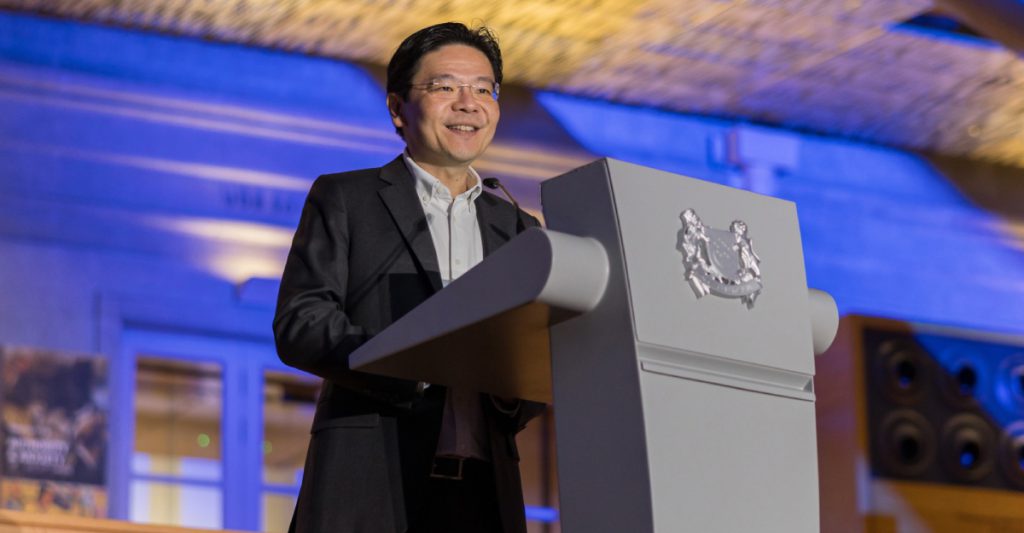
Deputy Prime Minister (DPM) Lawrence Wong has unveiled Singapore’s updated National AI Strategy (NAIS) 2.0 at the Singapore Conference on AI yesterday (December 4).
The new strategy, which aims to position the city-state as a world leader in AI, underscores 15 courses of actions that Singapore will undertake over the next three to five years.
These include the launch of AI-specific training programmes and the establishment of a dedicated physical space for AI to “drive innovation and growth through AI”, while “empowering people and businesses to understand and engage with AI”.
Growing Singapore’s AI talent pool and startup ecosystem
The 15 courses of actions — which is the result of consultations with more than 300 local and international experts and organisations — can be categorised under 10 key domains identified by the government: talent, capabilities, placemaking, industry, government, research, compute, data, trusted environment, and leader in thought and action.
These actions will also be continuously reviewed by the government to “respond to fast-moving developments in AI, across various domains”.
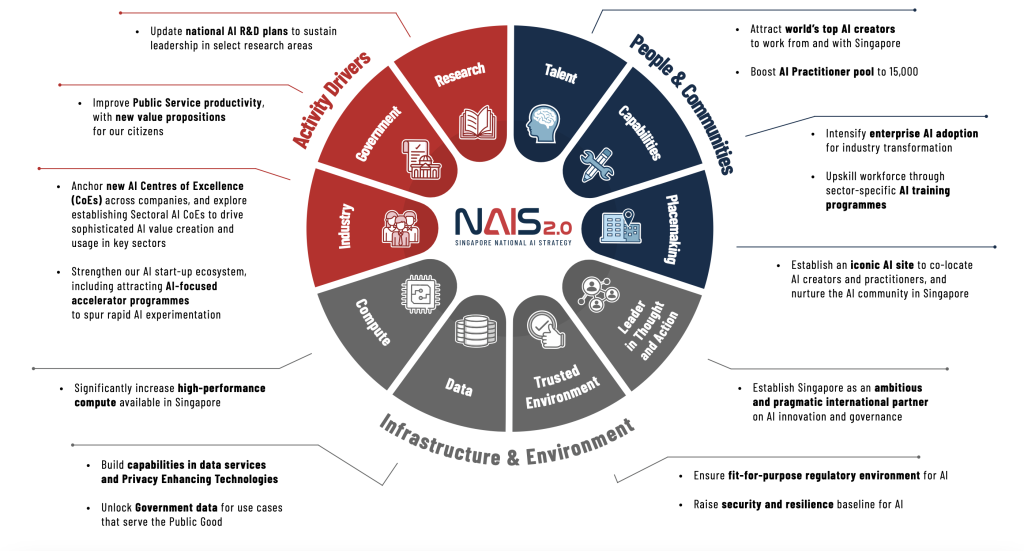
To grow and nurture the city-state’s talent pool, the government will be revamping and scaling AI Singapore (AISG)’s AI Apprenticeship Programme, a nine-month programme that grooms AI engineers for industry, and work with industry AI product development teams to expand company attachments.
Recognising that AI will significantly transform various job functions and leave profound impacts on jobs and livelihoods, the government plans to double down on its investment into adult education and training to reskill and upskill workers through the development of sector-specific AI training programmes.
In addition to these efforts, Singapore will also intensify the promotion of AI adoption across all enterprises to drive industry-wide transformation.
Beyond the local talent pool, Singapore aims to attract the world’s top AI creators and more than triple the number of AI practitioners across the city-state to 15,000 over the next three to five years. To nurture this AI community, the city-state is also looking to establish an “iconic AI site” to co-locate these AI creators and practitioners.
Meanwhile, in collaboration with private sector partners, Singapore is looking to strengthen its AI start-up ecosystem by attracting more venture builders and developing more accelerator programmes.
“We want to speed up AI value discovery across industry, and nurture a pipeline of disruptive, AI-native start-ups. These accelerator programmes could be led by a mix of big technology companies and venture capital firms,” said DPM Wong at the launch of NAIS 2.0.
Making Singapore a conducive place for AI value creation
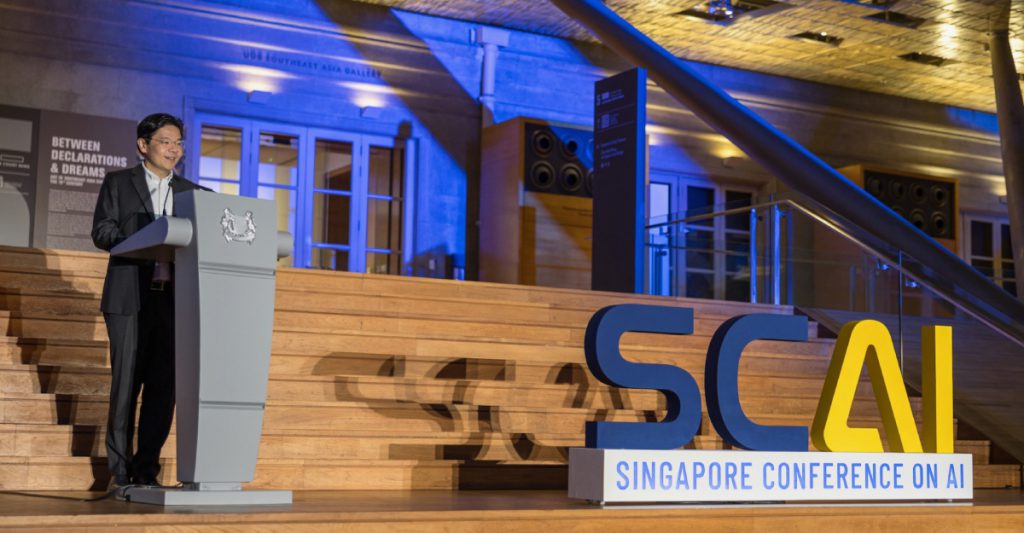
To serve Singapore’s AI ambitions, the government is looking to establish robust infrastructures to make Singapore a more conducive place for AI value creation.
As part of these efforts, the government plans to increase Singapore’s high-performance compute capacity.
The increasing scale and proliferation of AI models have driven exponential growth in demand for chips that can support AI workloads compute. As such, the city-state is looking to deepen its partnerships with chipmakers and cloud service providers.
The government will also ensure sufficient carbon budget is allocated towards data centres, while selectively unlocking more public sector data for AI development that can serve the public good.
Given that there is a range of potential risks around AI, the city-state will take differentiated approaches to managing risks to and from AI. This includes the review and adjustment of appropriate governance and security frameworks for AI systems to address novel risks associated with the tech.
While strict regulations around the use of AI can curb the risks and challenges of AI, regulatory overreach can stifle innovation. As such, Singapore is actively seeking middle ground by encouraging innovation and experimentation while enforcing the necessary guardrails.
Singapore is investing S$70 million to develop SEA’s first regional LLM
In line with NAIS 2.0, Singapore’s Infocomm Media Development Authority (IMDA) is partnering with AISG and the Agency for Science, Technology and Research (A*STAR) to launch a S$70 million initiative — funded by the National Research Foundation — to pioneer the development of a localised large language model (LLM) that can understand and generate human language that incorporates the diverse cultures and languages of Southeast Asia.
The LLM project will build on the early findings of AISG’s Southeast Asian Languages in One Network (Sea-Lion) model, an open source LLM that was trained on 11 languages used in the region, including English, Chinese, Indonesian, Malay, Thai and Vietnamese.
According to a joint statement by the three agencies, this initiative — otherwise known as the National Multimodal LLM Programme (NMLP) — will bridge a gap in the current AI landscape, which is primarily dominated by LLMs originating from Western countries.
The NMLP will be developed and launched over the next two years.
The government has invested over S$500 million in R&D
In 2019, Singapore was one of the first countries in the world to introduce a National AI Strategy. The city-state has embarked on various National AI Projects across various verticals, including education, healthcare, as well as safety and security.
To date, the government has committed more than S$500 million through AISG under the Research, Innovation and Enterprise (RIE) 2020 and 2025 plans.
With recent advances, especially in Generative AI, opening the doors to new possibilities, Singapore aims to “be a place where AI serves as a force for good, and where we harness AI to uplift and empower our people and businesses” through NAIS 2.0.
Singapore believes in the transformative potential of AI. Our second National AI Strategy, or NAIS 2.0, represents Singapore’s commitment to realise the benefits of AI, and to create exciting new opportunities.
– DPM Lawrence Wong
Featured Image Credit: Singapore Conference on AI
Also Read: AI job interviews: The rise of AI in recruiting can streamline hiring, but at what cost?
This M’sian team spent 2 yrs innovating plant-based meat, here’s what they’ve achieved

According to Statista, the current revenue in Malaysia’s meat substitutes market amounts to US$15.34 million in 2023. This number is projected to grow annually by 8.64% (CAGR from 2023 to 2028).
So it’s clear that the trends show an increasing interest in plant-based diets. It’s not a fad that will go away anytime soon, and some Malaysian brands are meeting this demand.
This includes WonderMeat by GoodMorning Global, Malaysia’s first dry mix complete nutrition plant-based meat.

An alternative meat in the form of powder?
You might be wondering, what is dry mix plant-based meat? Well, it’s exactly what it sounds like. The plant-based meat comes in the form of dry granules.
To prepare it, you need to mix a ratio of 30% WonderMeat, 10% oil, and 60% water together. Once that’s done, leave it to sit in the refrigerator for 15 to 30 minutes. You can then proceed to shaping the plant-based meat according to your preferences for cooking.
Now, this isn’t an entirely new concept as there are other brands like Singapore’s Thoughtful Food offering it as well. But it’s not a common sight in the Malaysian market.
Most times, you’ll only find frozen plant-based meats in grocery stores. So how and why did the brand decide to go this route instead of the usual frozen concept?

On this, GoodMorning Global’s founder and Group Executive Chairman, Dato Dr. Lim Sin Boon, told us that it came down to four main factors:
- It’s easier to store and transport as no refrigeration is required
- It has a longer shelf life, which makes it more sustainable
- It’s easier to shape, making it convenient for users to prepare and cook
- It saves more energy and therefore aligns with the company’s ESG goals
With a goal of innovating the local meat industry
It’s an interesting sight when you browse through GoodMorning Global’s website, as the majority of its products are actually beverage powders. All of which are plant-based too.
So I was curious as to why they decided to dive into the meat industry. Sure, they’re both within the F&B sectors, but each product is in its own way a different ballgame.
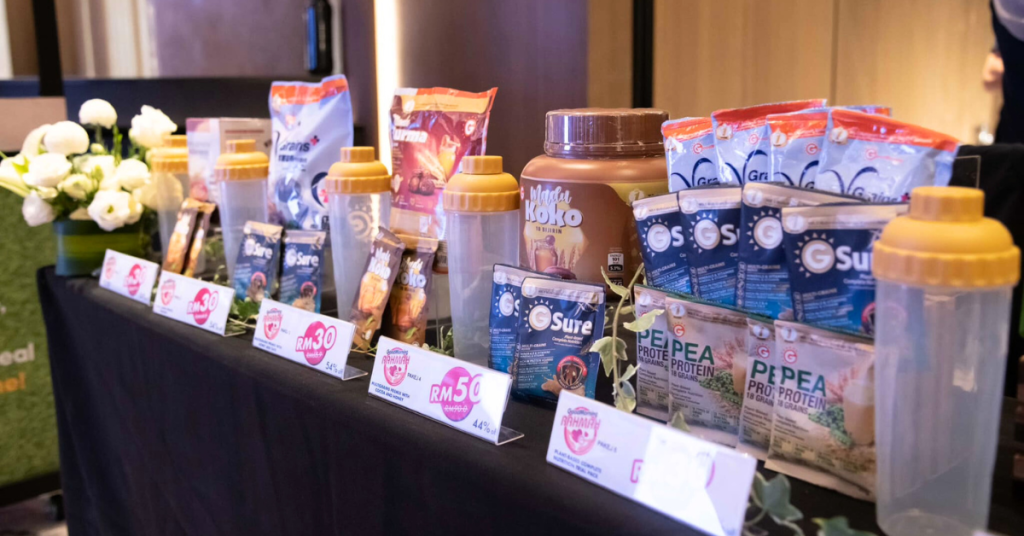
Speaking candidly, Dr. Lim shared, “As I learnt more about climate change and the food crisis that the world faces, I wanted to do my part in resolving the crisis, by cutting short supply chains.”
One of the ideas he came up with was to further innovate the local meat industry.
Hence,the company entered a joint R&D collaboration with Universiti Tunku Abdul Rahman (UTAR). The partnership was facilitated by Bioeconomy Corporation, a development agency for the local biotech industry under the purview of the Ministry of Science, Technology and Innovation (MOSTI).
It’s made to mimic the feeling of eating real meat
After about two years of R&D and trial and error, GoodMorning Global successfully developed WonderMeat. This plant-based meat is mainly made of soya bean and pea.
The brand’s founder also explained that it’s fortified with 28 types of vitamins and minerals to increase metabolism and immunity.
At the same time, it contains calcium β-hydroxy-β-methylbutyrate (CaHMB) which improves muscle mass and strength, and dietary fibre for digestion and bowel movement.

“We were already developing multigrain beverages to improve health, and we knew that protein was very important to our diet,” Dr. Lim explained. “[So] we tried to develop a form of protein which would replace natural meat. This is great for people who still like the taste of meat, but are interested in going more plant-based.”
It’s one of the challenges they faced during R&D, as the goal was to mimic the taste and mouthfeel of meat while still ensuring its nutritional value.
Made for the convenience of B2B & B2C customers
Currently, WonderMeat is targeting customers in the HORECA (hospitality, restaurant, and cafe) space. Which is why the product is only available for direct home-use purchases on its website for now.
But looking further ahead, the brand does plan on exploring the B2C market by introducing WonderMeat to other retail channels. “We are also having outreach programmes and collaborations to promote WonderMeat within the community, targeting consumers directly,” the founder shared.

One pack of WonderMeat is priced at RM5.50. This can produce approximately 200g to 240g of wet mix and amounts to about two servings.
The brand also clarified that WonderMeat can be stored for use on a later date once mixed, but it should be kept refrigerated the whole time. And it’s recommended to be consumed within three days.
With that in mind, it’s probably best to keep the plant-based meat in its dry mix form. This would make it less of a hassle in terms of storing and transporting.
With a commitment to sustainability
Aligning with the brand’s concern over climate change, Dr. Lim mentioned that GoodMorning Global is committed to sustainability. This is reflected in the company’s practices, like prioritising environmentally-friendly sourcing and production methods.
For example, with WonderMeat coming in dry form instead of frozen, it reduces resource consumption and emissions. This is because it doesn’t need a freezer for storing and distribution.

Similarly, GoodMorning Global also installed solar energy panels in its manufacturing plant to reduce the carbon footprint of the production process.
“Moving forward, we are looking into developing food based on microbial protein utilising yeast and fungi,” the founder expressed. Along with that, customers could expect more variations of WonderMeat that meet consumer preferences.
With a rise in plant-based brands and eateries in Malaysia, I’m curious to see how WonderMeat will contribute to the scene. Personally, I believe that due to its convenient dry-mix form, it has the potential of growing the community of plant-based consumers in Malaysia, and even overseas.
Also Read: VPS can be a cost-effective & scalable asset for modern companies, this M’sian biz shows how
Featured Image Credit: WonderMeat

